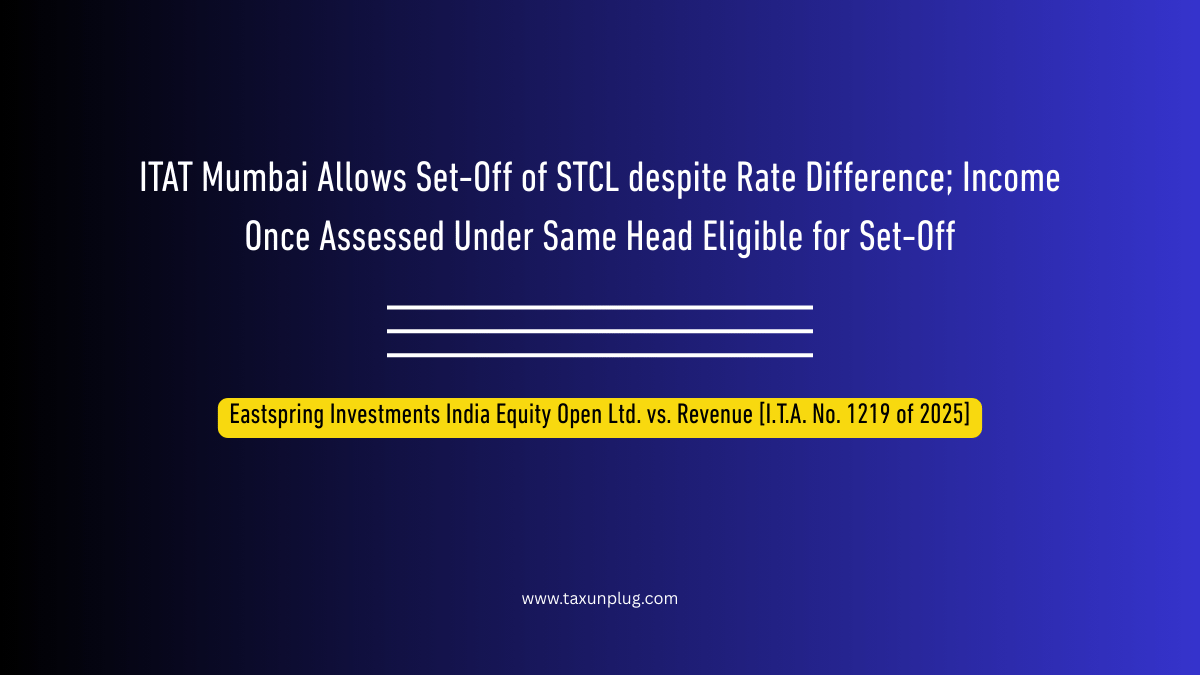ITAT Mumbai STCL Set-Off
Eastspring Investments India Equity Open Ltd. vs. Revenue [I.T.A. No. 1219 of 2025]
Background of the Case
The appellant, is a SEBI-registered Foreign Portfolio Investor (FPI) based in Mauritius, filed its return of income for AY 2022–23 declaring total income of Rs. 1,309.50 crore, including STCG of Rs. 1,96.34 crore (taxable at 15% under Section 111A) and STCG of Rs. 3.16 crore (taxable at 30% under Section 115AD) from the sale of right forms (not subject to STT). It also reported STCL of Rs. 24.24 crore on STT-paid transactions. The appellant followed a set-off mechanism whereby it first adjusted the brought forward STCL against the higher-taxable gains (30% on non-STT transactions), and then adjusted the balance against 15% taxable gains. The Assessing Officer (AO), however, rejected this computation, arguing that losses taxed at lower rates (15%) should not be first adjusted against gains taxed at higher rates (30%).
The DRP upheld the AO’s view and treated the entire Rs. 175.26 crore (Rs. 172.09 crore + Rs. 3.16 crore) as STCG, but taxed it as “Income from Other Sources” at 40%, also initiating penalty proceedings under Section 270A.
Arguments by the Appellant
The appellant argued that under section 70(2) of the Income Tax Act, any short-term capital loss can be set off against any short-term capital gain, regardless of the nature of underlying transactions or the applicable tax rates. It was emphasized that both the gains and losses arose under the same head of income, i.e., “Capital Gains,” and hence were eligible for set-off. The appellant further contended that the entire income from share transactions by FPIs is to be treated as capital gains as per CBDT Circular No. 6/2016 and consistent judicial precedent. They also challenged the AO’s treatment of Rs. 3.16 crores earned from rights entitlement sale as “Income from Other Sources,” asserting that such income, too, arose from a capital asset and must be taxed under the head “Capital Gains.”
Respondent’s Response
The Revenue, on the other hand, took the position that the set-off of brought forward STCL arising from STT-paid transactions should not be allowed against STCG from non-STT transactions. They argued that since different tax rates applied at the rate of 15% for STT-paid transactions under section 111A and 30% for non-STT transactions under section 115AD, the character of the income was inherently different. The Assessing Officer, supported by the DRP, also treated the Rs. 3.16 crores earned from the sale of rights entitlement as not arising from a capital asset and hence taxable under “Income from Other Sources,” disallowing both the set-off and the capital gains classification.
Court Findings and Decision
The ITAT Mumbai bench rejected the Revenue’s arguments and ruled in favour of the appellant. It held that the distinction in tax rates under sections 111A and 115AD does not affect the nature of income under the head “Capital Gains.” The Tribunal clarified that once an income is assessed under the same head, set-off cannot be denied merely due to different applicable rates. It also noted that the rights entitlement sold by the appellant was a capital asset under section 2(14), and therefore the gain on its transfer must be taxed as capital gains. Relying on CBDT Circular No. 6/2016 and past rulings including Platinum Investment Management Ltd., the ITAT concluded that FPIs are to be assessed under the “Capital Gains” head for such transactions, and directed the AO to allow the set-off and rectify the incorrect head of income.
To download official order, Click Here
ITAT Mumbai STCL Set-Off
“The site is for information purposes only and does not provide legal advice of any sort. Viewing this site, receipt of information contained on this site, or the transmission of information from or to this site does not constitute an attorney-client relationship. The information on this site is not intended to be a substitute for professional advice.”

